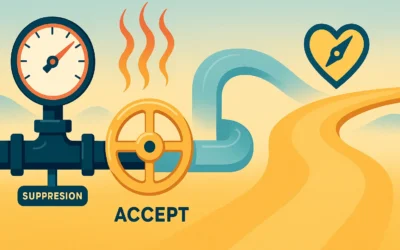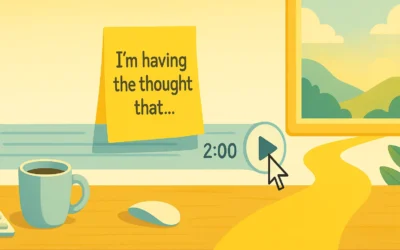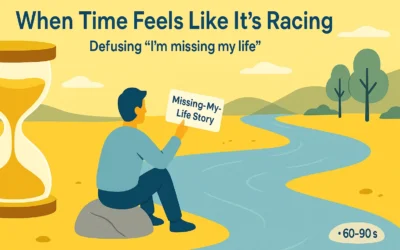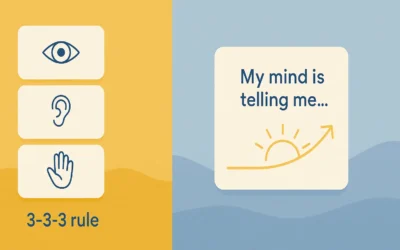Have you ever sat down to work and heard a voice inside whisper, “I’m terrible at this”?
That thought can tighten around your chest in seconds, draining focus before you even begin.
Today you’ll learn a one-minute move straight from defusion, a core process in Acceptance & Commitment Therapy (ACT), that turns that voice from a judge into background chatter. We’ll walk through the exact words, why they work, and how you can practise a deeper version inside our guided chatbot session.
Why Words Feel So Heavy
Your mind is a brilliant storyteller. Most days that’s a gift; it lets you plan, create, day-dream. The downside is that your brain can forget it’s telling a story and start treating the words as hard facts. “I’m terrible at this” lands like a verdict rather than a passing thought.
Defusion is the skill of stepping back from those sentences so they lose their grip. You’re not pushing the thought away or arguing with it; you’re simply changing your relationship to it, watching it like you’d watch clouds drift past a window.
The 60-Second Defusion Move
Grab the single thought that’s nagging you right now. Got it? Good. Now:
- Voice the sentence exactly as it appears: “I’m terrible at this.”
- Insert four words at the front: “I’m having the thought that I’m terrible at this.”
- Say the new sentence once, slowly: Notice the subtle shift: it now sounds more like _words_ than _truth_.
- Breathe once: Let the sentence float there, untangled from your identity.
Most people feel a hair-breadth of distance open up—like they’ve stepped half a metre back from the billboard in their mind. That gap is defusion.
Why This Tiny Tweak Works
Language is sticky. When you prepend _“I’m having the thought that…”_ you remind yourself that you are _observing_ a thought, not _obeying_ a fact. Neuroscience studies show that labelling internal experiences (even with a single phrase) dampens the brain’s threat response and re-engages the prefrontal cortex the part that plans and problem-solves.
Want to Deepen the Effect?
Our chatbot guides you through a three-minute Defusion Session that layers breathing, visual distancing, and a quick reality check. It’s bite-sized, phone-friendly, and designed with psychologists who live and breathe ACT.
Real-world proof: In last week’s beta, 11 of 18 first-time users said the session gave them “a fresh way of looking at the same worry” and returned for the next module.
If you’d like to feel the gap widen, tap the link below, choose _Defusion Session_, and try it now:
Take the Thought, Not the Bait
Self-doubt will visit again, it visits everyone who ever tries to do something meaningful. The trick isn’t to silence the voice forever; it’s to recognise it for what it is: _just another sentence in your mind’s endless parade_. With a sixty-second defusion move (and a little guided practice) you can notice the story, nod politely, and get on with the work that matters.













0 Comments